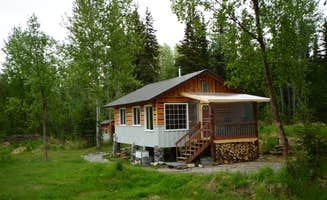Lake Clark National Park & Preserve offers remote cabin accommodations for wilderness adventurers seeking solitude in Port Alsworth, Alaska. These rustic structures provide shelter in an area accessible primarily by small aircraft or boat transportation. Winter temperatures can drop below -30°F, while summer brings mild 60-70°F conditions with extended daylight hours.
What to do
Kayaking adventures: Visitors to Joe Thompson Cabin can explore the series of islands near the shoreline. "This historical route was climbed daily by Joe Thompson as he mined for gold near the summit," notes one camper who recommends combining Joe Thompson Cabin with Priest Rock for a kayak tour of Lake Clark.
Hiking exploration: Portage Creek trail begins directly behind Joe Thompson Cabin and leads above the tree line in under two hours. The trail follows historical routes used by early miners and provides elevated vantage points of the surrounding landscape. The terrain requires proper footwear and basic navigation skills.
Fishing opportunities: Lake Clark offers multiple fishing spots accessible from cabin locations. Anglers can target various fish species including salmon during seasonal runs. Local regulations apply and licenses are required for all fishing activities.
What campers like
Historical connection: The log cabin accommodations at Priest Rock Cabin provide an authentic Alaska experience. "The cabin is furnished with bunk beds and NRS sleeping mats," reports one visitor who appreciated the warm shelter with minimal modern conveniences.
Scenic isolation: Cabins positioned along Lake Clark's shoreline deliver unobstructed water views and mountain backdrops. Wildlife viewing opportunities include bears, moose, and various bird species depending on season and location. Most cabins sit in relative isolation from other structures.
Tent camping options: Areas surrounding the cabins offer tent sites for those wanting more privacy or for larger groups. Level ground with adequate drainage provides viable alternatives to cabin sleeping arrangements, though weather considerations remain important year-round.
What you should know
Transportation logistics: Reaching these cabins requires advance planning with boat transportation services. Tulchina Adventures offers water taxi services, kayak rentals, and camping gear rentals in Port Alsworth for cabin visitors. Weather conditions can delay transportation, so flexible scheduling is advisable.
Lighting requirements: Most cabins have limited natural lighting due to minimal windows. Visitors should pack lanterns, headlamps, and extra batteries for adequate illumination, especially during shoulder seasons with fewer daylight hours.
Supply considerations: No stores exist near cabin locations, requiring complete self-sufficiency for food, first aid, and emergency supplies. Water must be treated from lake sources, and all waste must be packed out according to national park regulations. Cell service is nonexistent in most areas.
Tips for camping with families
Activity planning: Maintain engagement for younger visitors by bringing games, field guides, and wildlife tracking activities. The shoreline areas provide natural exploration zones with opportunities to observe tracks, plants, and aquatic life in protected shallow areas.
Safety protocols: Establish clear boundaries around cabins and water access points with children. Weather can change rapidly, requiring appropriate clothing layers even in summer months. Animal safety education should occur before arrival to ensure proper reactions to potential wildlife encounters.
Cabin selection: Larger families should consider the space limitations of each structure when making reservations. The sleeping arrangements at most cabins include shared spaces without privacy dividers, though nearby tent options can supplement sleeping areas for older children or additional family members.
Tips from RVers
Equipment transfer: Standard RVs cannot access cabin locations, requiring transfer of supplies to water transportation. Pack essential items in waterproof containers that can withstand boat transportation and potential weather exposure during transfer.
Alternative accommodations: RV travelers seeking more accessible options can find limited facilities in Port Alsworth proper, though amenities remain basic. Most RV travelers use these locations as base camps before transitioning to water-accessible cabin camping near Port Alsworth, Alaska.
Supply management: Without hookups or dump stations at cabin locations, RV campers must adapt their usual systems for off-grid conditions. Water conservation, waste management, and power limitations require advance planning and appropriate equipment selection.



